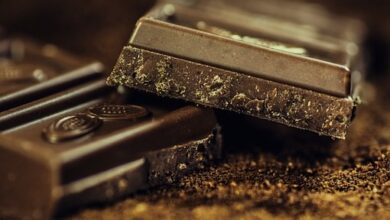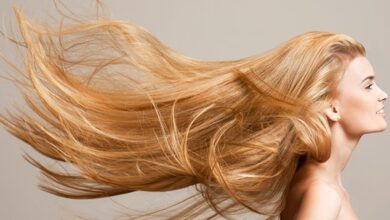1. Sample Diet Chart For Six Pack Abs
| Meals | What To Eat |
|---|---|
| Early Morning (7:00 – 7:45 am) | 1 cup lemon water with honey and cinnamon |
| Breakfast (8:15 – 9:00 am) | Quinoa/oatmeal/eggs + 1 multigrain bread + 1 cup milk and 4-6 almonds |
| Lunch (12:30 – 1:00 pm) | Lettuce boats or chicken/veggie salad |
| Evening Snack (4:00 pm) | Green tea/fresh fruit juice + unsalted popcorn |
| Dinner (7:00 – 7:30 pm) | Chicken/mushroom clear soup with lots of fiber-rich veggies/boiled black beans and blanched veggies |
Here are some more women’s six-pack abs diet tips.
2. Load Up On Lean Protein
Protein is food for muscles. Consume lean protein to help repair and rebuild your muscles because a lot of wear and tear occurs when you work out (1). Include foods like chicken breast, mushroom, lentils, fish, beans, and soy in your diet to give your muscles the required nutrition.
3. Do Not Avoid Healthy Fats
Healthy fats do not make you gain weight. Healthy fats help reduce inflammation and prevent inflammation-induced weight gain (2). Consume almonds, walnuts, macadamia nuts, pine nuts, avocado, fatty fish, chia seeds, flax seeds, pumpkin seeds, olive oil, cheese, dark chocolate, and eggs.
4. You Need Dietary Fiber
We often assume that we need to avoid carbs to lose weight. But that’s not true. You need the right type of carbs. Dietary fiber is a type of carb that cannot be digested by humans but aids weight loss by keeping you full for a longer duration and preventing fat absorption (3), (4), (5). Consume broccoli, flax seeds, prune, peaches, pear, apple, lima beans, black beans, figs, berries, oats bran, barley, green peas, guava, peach, Brussels sprouts, artichokes, pomegranate, kiwi, brown rice, beetroot, quinoa, and acorn squash.
5. Drink Up
Usually, when you are thirsty but don’t drink water, you may think you are hungry and load up on calories. Moreover, not drinking enough water can prevent your cells from performing their functions, leading to slow metabolism, dehydration, constipation, and bloating (6). Drink at least 2-3 liters of water per day. You can also drink infused water, fresh fruit or vegetable juices, smoothies, coconut water, and buttermilk.
6. No Starving
If you think you will lose weight by starving yourself, you are mistaken. Not eating for a prolonged period may signal the body to shift to the starvation mode, and it will stop using any calories consumed as usable energy. The extra calories will get stored as fat, leading to weight gain. Eat every 2-4 hours to keep your metabolism active and the cells functioning properly.
7. Consume Fat Burners
Some foods help burn calories apart from nourishing your body. Include fat-burning foods in your diet to help you shed fat. Consume grapefruit, green tea, brown rice, quinoa, cayenne pepper, black pepper, celery, cinnamon, yogurt, low-fat milk, nuts, turmeric, dark chocolate, apple cider vinegar, spinach, cauliflower, garlic, and peanut butter. Here’s a list of other foods to eat to get six-pack abs.
Brooke Cavalla, a Certified Prenatal/Postnatal Exercise Specialist, says, “Coffee itself is not directly related to sculpting a 6-pack. It certainly can help boost energy levels and give you a little more “push” during your workouts, which is what helps you burn and get 6-pack abs. When coupled with regular exercise and healthy eating habits, coffee can help give your workouts an extra boost.”
She adds, “There has been some research to suggest that caffeine, the main ingredient in coffee, can help boost your resting metabolic rate (RMR) and reduce hunger signals. RMR is the rate at which your body burns calories.”
With a sample diet plan in hand, you can start your six-pack ab journey. However, it is also important to know the foods one must avoid to achieve effective results. Scroll down to know more.
Foods To Avoid For Six-Pack Abs
- Processed Foods: Foods high in sugars, sodium, and unhealthy fats
- Sugar-Sweetened Beverages: Sugary drinks like fruit juices, soda, and energy drinks.
- Refined Grains: White flour, pasta, white bread, and white rice.
- Deep-Fried Foods: Fried chicken, french fries, and other fried foods.
- Alcohol: Beer, red wine, white wine, vodka, whiskey, gin, and rum.
- Sugary Snacks: Cookies, cakes, candy, and other sugary snacks.
- Fatty Cuts Of Meat: Lean proteins such as tofu, fish, chicken, and turkey.
You now know how to take care of your fitness and diet to get those killer abs. But the most important thing is to be able to maintain the weight loss and your six-pack abs. Here’s how you can maintain your hard-earned six-pack abs.
Lifestyle Changes To Maintain Six Pack Abs
Lifestyle changes help you beyond maintaining your six-pack abs. They give you an inner makeover. Once you get used to a new and better lifestyle, you will love the positive changes and not want to go back. Here’s what you should do:
1. Stop Hitting Snooze
We all do it – keep hitting the snooze button until it’s too late even to take a shower! But if you want to retain your amazing abs, you must drag yourself out of bed. If you wake up early or say, at least 2 hours before you head out, you can do yoga or workout, prepare breakfast and lunch, and not look like you rushed to work or school without brushing your hair.
2. Reduce Stress
Stress is harmful in many ways. When you are stressed, the hormone cortisol is released, which increases the glucose levels in your blood and causes increased hunger (7), (8). This leads to fat deposition in the abdominal area and, in some cases, insulin resistance and diabetes (9). Yoga, meditation, cardiovascular exercise, weight training, playing a sport, swimming, painting, reading books, traveling, listening to music, and even applying makeup for fun can help reduce stress.
3. Don’t Skip Breakfast
If you miss breakfast, you will feel hungry all day long. You need to have a substantial breakfast to help your body function normally. Include fiber, protein, and healthy fats in your breakfast to have a complete and balanced meal before you start your day.
4. Avoid Junk
Wondering what to eat to get a six-pack? Avoid junk food. High-carb, high-calorie, and zero nutritional value foods are junk foods. They do nothing but harm your health. Avoid snacking on junk food, such as potato chips, fries, fried chicken, Indian fried snacks, etc. Also, avoid midnight snacking.
5. Weekly Workout
Working out is essential if you want to maintain your abs. Work out at least 4 hours a week to keep yourself in shape. Do a mix of cardio, weights, and strength training to shed the fat and build lean muscle mass.
6. Build Social Support
Social support is the most important factor when it comes to weight loss or maintaining it. Associate with people who have lost weight or want to lose weight and are serious about it. You can learn a lot from them and stay motivated.
7. Share Your Calories
You may have a craving for a certain dessert or fried food. Well, if you do decide to give in, share your dessert or fried food with your friends or spouse to consume fewer calories. Also, when you eat, use smaller bowls or plates to signal your brain that you are consuming enough and don’t require any more food.
Amy Carrad, a blogger, shares her journey through a disordered relationship with exercise and eating, highlighting the shift from unhealthy eating habits to a focus on food purity. She writes, “When I realized I was no longer healthy I questioned why I had the behaviors I did. In the beginning, it was always because I was doing it to be healthy for life. So it made no sense that I kept doing it when I had the evidence that I was too lean to be healthy anymore (i).”
Sources
- Role of dietary protein in post-exercise muscle reconditioning, Nestlé Nutrition Institute Workshop Series, US National Library of Medicine, National Institutes of Health.
https://www.ncbi.nlm.nih.gov/pubmed/23765352 - Good Fats versus Bad Fats: A Comparison of Fatty Acids in the Promotion of Insulin Resistance, Inflammation, and Obesity, Missouri Medicine, US National Library of Medicine, National Institutes of Health.
https://www.ncbi.nlm.nih.gov/pmc/articles/PMC6140086/ - Dietary fiber and weight regulation, Nutrition Reviews, US National Library of Medicine, National Institutes of Health.
https://www.ncbi.nlm.nih.gov/pubmed/11396693 - Interrelated effects of dietary fiber and fat on lymphatic cholesterol and triglyceride absorption in rats, The Journal of Nutrition, US National Library of Medicine, National Institutes of Health.
https://www.ncbi.nlm.nih.gov/pubmed/2555465 - Effects of Dietary Fiber and Its Components on Metabolic Health, Nutrients, US National Library of Medicine, National Institutes of Health.
https://www.ncbi.nlm.nih.gov/pmc/articles/PMC3257631/ - Water, Hydration and Health, Nutrition Reviews, US National Library of Medicine, National Institutes of Health.
https://www.ncbi.nlm.nih.gov/pmc/articles/PMC2908954/ - Cortisol increases gluconeogenesis in humans: its role in the metabolic syndrome, Clinical Science, US National Library of Medicine, National Institutes of Health.
https://www.ncbi.nlm.nih.gov/pubmed/11724664 - Stress, cortisol, and other appetite-related hormones: Prospective prediction of 6-month changes in food cravings and weight, Obesity, US National Library of Medicine, National Institutes of Health.
https://www.ncbi.nlm.nih.gov/pmc/articles/PMC5373497/ - Abdominal fat and insulin resistance in normal and overweight women: Direct measurements reveal a strong relationship in subjects at both low and high risk of NIDDM, Diabetes, US National Library of Medicine, National Institutes of Health.
https://www.ncbi.nlm.nih.gov/pubmed/8621015




